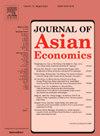Land titling: Promoting internal migration in China?
IF 3.4
3区 经济学
Q1 ECONOMICS
引用次数: 0
Abstract
Land tenure security is widely recognized as a critical factor in facilitating labor reallocation across many developing economies. This study examines the impact of China’s latest land titling programme (LTP), which aimed to increase land tenure security by issuing certificates after measuring and registering agricultural land across rural households. Using nationally representative household-level data, we employ a triple difference approach (comparing households with land endowment to those without) and find that, in general, the LTP exerts a significantly positive effect on rural households’ migration for non-farm work. We further observe that such influences on migration are largely affected by regional differences and the sectoral composition. Additionally, transportation construction and rising housing prices do not significantly affect the policy effectiveness, while government expenditure for people’s livelihood is critical to the LTP's effectiveness, though the effects vary across distinct categories of livelihood expenditure: social security and employment, education, and healthcare. Finally, the regional variations in policy effect can be attributed to the relative strength of two countervailing mechanisms: the “labour absorption effect” and the “migration promotion effect”—differences driven by sectoral disparities across regions.
土地所有权:促进中国内部人口流动?
在许多发展中经济体,土地保有权保障被广泛认为是促进劳动力再分配的关键因素。本研究考察了中国最新的土地所有权计划(LTP)的影响,该计划旨在通过在农户测量和登记农业用地后颁发证书来增加土地所有权保障。使用具有全国代表性的家庭数据,我们采用了三差方法(将有土地禀赋的家庭与没有土地禀赋的家庭进行比较),并发现,总体而言,LTP对农户从事非农工作的迁移具有显著的积极影响。我们进一步观察到,这种对移民的影响在很大程度上受到区域差异和部门构成的影响。此外,交通建设和房价上涨对政策有效性没有显著影响,而政府民生支出对LTP的有效性至关重要,尽管不同类别的民生支出(社会保障和就业、教育和医疗保健)的影响有所不同。最后,政策效果的区域差异可归因于两种抵消机制的相对强度:“劳动力吸收效应”和“移民促进效应”——区域间部门差异驱动的差异。
本文章由计算机程序翻译,如有差异,请以英文原文为准。
求助全文
约1分钟内获得全文
求助全文
来源期刊

Journal of Asian Economics
ECONOMICS-
CiteScore
4.70
自引率
9.40%
发文量
90
期刊介绍:
The Journal of Asian Economics provides a forum for publication of increasingly growing research in Asian economic studies and a unique forum for continental Asian economic studies with focus on (i) special studies in adaptive innovation paradigms in Asian economic regimes, (ii) studies relative to unique dimensions of Asian economic development paradigm, as they are investigated by researchers, (iii) comparative studies of development paradigms in other developing continents, Latin America and Africa, (iv) the emerging new pattern of comparative advantages between Asian countries and the United States and North America.
 求助内容:
求助内容: 应助结果提醒方式:
应助结果提醒方式:


